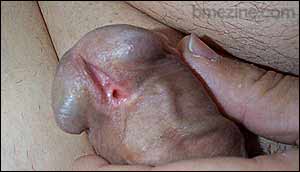Hypospadia
A hypospadia is a birth defect where the urethra and urethral groove are malformed, causing the urethra to exit the penis sooner than it normally would (ie. closer to the base, rather than at the tip of the glans). In minor cases (hypospadias affect about one in a hundred men to some extent), the penis appears to have a meatotomy (so if you see a guy in a porn with a meatotomy, don't get too excited: it's far more likely to be a hypospadia). The glans may be a little shorter and wider than usual and have a "pulled down" appearance. This often makes it difficult to control the urine stream.
In some cases, having this condition can preclude getting a Prince Albert piercing, but not always. In more extreme cases, the penis can be deeply affected (typically short and wide with a noted downward curve), but all standard male genital piercings should still be possible (although ampallangs and apadravyas may not be transurethral as they normally would be). Subincisions and meatotomies can be cut back from a hypospadia's urethral exit just like with a "normal" penis, thereby correcting the abnormality (assuming you don't see a subincision as a bigger problem).
